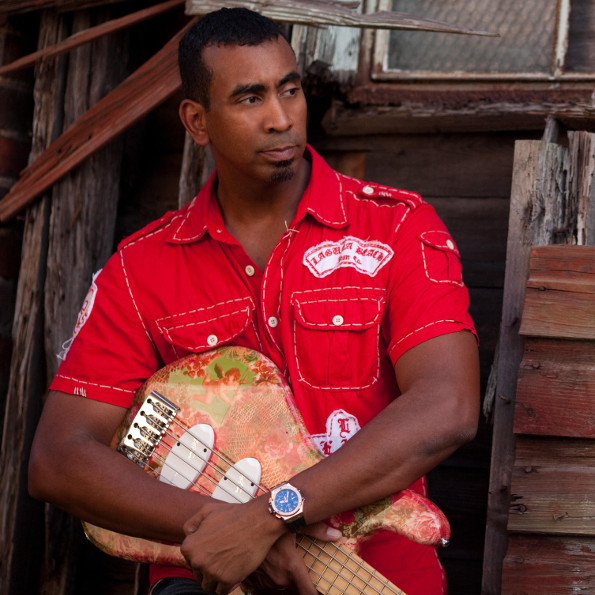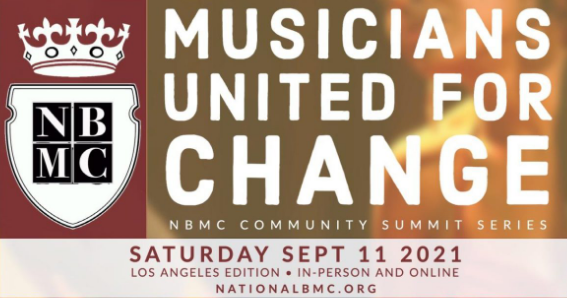Bass Great Chip Shearin, Making a Difference with the National Black Musicians Coalition
If you’re in LA on Saturday, September 11, you’ll know exactly where to find the iconic bassist Chip Shearin: He’ll be rolling out the vital new Community Summit event series from the National Black Musicians Coalition (NBMC) as they present, “Musicians United for Change.”
Free to attend and open to all, Musicians United for Change begins check-in at 10 AM PT and kickoff is 11 AM PT. It will take place at Greater Emmanuel Temple Church in Lynwood, CA. Virtual attendance is also available for registered attendees worldwide.
Throughout the day, musicians and audio professionals will experience a full program of interaction with community leaders, public safety officials and others from the creative community. A scholarship giveaway, Q&A segment on business development, and more are on the agenda.

The acclaimed LA bassist Chip Shearin is President and Co-Founder of the National Black Musicians Coalition.
Shearin serves as President and Co-Founder of the NBMC. A trailblazing bassist, he was inducted into the Rock N Roll Hall of Fame in 2010.
His landmark bass line for the Sugarhill Gang classic “Rapper’s Delight” usually grabs headlines. Shearin is a prolific session player, composer, and producer whose huge body of work spans Janet Jackson, Christina Aguilera, Faith Evans, Michael Bolton, George Howard, Kirk Whalum, Bob Baldwin, Marion Meadows, Bob James, Steve Reid, Howard Hewitt, Phil Perry, Special EFX, Jeff Kashiwa, Ceilli Minuchi, Polina, Pieces of a Dream and YahZarah.
Shearin spoke with SonicScoop about the organization and its Community Summit Series.
Chip, although the name of the organization is the National Black Musicians Coalition, I take it that studio professionals are also included in this group?
Absolutely. Dave Hampton, who designed Prince’s studio and is the studio engineer for Herbie Hancock, is one of our Executive Directors. So we are about everybody, even people who can do back line. If they have a love for music and a love for this industry, those are the people.
What was the inspiration for launching the Community Summit Series, which kicks off on September 11th in Los Angeles?
This was the culmination of a lot of work that went before it. Since the death of George Floyd, which to be quite honest, for many companies, they had knee jerk reactions. A lot of them had to put out statements which they thought were going to protect their brand or make their brand appear to be inclusive.
Our idea was to make sure that it was more than just a statement, that it wasn’t just, “Okay. Well, we did that, now back to business as usual.” We wanted to make sure that all of the companies were understanding what the marketplace is for Black musicians, and we were looking for that equality and equity in both owning equipment, and being able to find jobs in the industry.
So for six months we had Zoom calls twice a month [with music industry executives] to talk about all of these issues. What I came up with, along with others in the coalition, was to challenge these companies to go through unconscious bias training. We looked at ways that they could be more inclusive and effective in their hiring practices moving forward.
This particular event you could say is a coming out party for us to get together with people and actually start the real work.
Education with Impact
There are 10 sessions at the event, including “Jobs & Entrepreneurship,” “Financial Literacy,” “Law Enforcement Relations,” “Strategic Partnerships,” “Management Strategies,” “Health & Wellness,” and more. What’s the common thread between the sessions?
We boiled it down to where we could strengthen the lives of Black musicians. It starts with “Health and Wellness,” we know we need to tackle that. That’s a big thing for all musicians, white or Black. A lot of musicians have lost touch of understanding that their ability to have longevity will always be based on the ability to control their health.
But musicians also have to learn how to make a living, and we want to talk about that. As you can see, just those two topics alone are about common-sense lifestyle. It’s nothing to do with how you need to know this chop or this lick to create a gig. Instead, it’s about knowing the mentality to work and the financial resources to feed yourself, feed your family, and have some sense of a professional life as you move forward.
Is there an element of saying to yourself, “What if I’d had these resources available to me when I was starting out?”
That is a big part of it and that’s why the mentorship of this is long-lasting for the members that we have. And so, a lot of the musicians will be standing up saying, “Hey, let me tell you the mistakes I’ve made.” We’re going to make sure that there’s open Q&A’s to address a lot of these, “I wish I had done/ Don’t make my mistake” scenarios.
With the “Law Enforcement Relations” track, we actually want to bridge the gap between law enforcement and Black musicians. What we want is for people on both sides to understand the difficulty presented by our social climate currently. Right now, we need to re-establish or build relationships with Law Enforcement and learn to hear each other. We are inviting an LAPD representative to come out to talk with us about just that.
Musicians are productive citizens nationally. Every city is home to many incredible creative spirits. We want to bridge that gap, and use our platform to open important communication for the good of our communities.
You’ve let me know that the event isn’t just for Black attendees.
We will not turn anyone away from getting the message. Like the NAACP, if you look over their mission statement, their focus was to enrich the lives of “Colored People,” the common term for Black people. Building equality for Black musicians, doesn’t mean tearing down the position of others or to be a detriment to others seeking and deserving the same. Strengthening the weakest links ultimately strengthens the entire chain. We invite all to come in support of stronger community bonds through music.
We all need to learn how to talk, how to get along, how to connect, how to share wonderful creative energies and ideas.
Real Results
Your event series has a host of other cities planned after LA on September 11th. What are the long-term best outcomes that you’re working towards?
This series will continue. The NBMC is a 501(c)(3) (charitable organization), and we have wonderful people who are coming on board including Shari Belafonte who is Harry Belafonte’s daughter, Harvey Mason, Victor Wooten, Sheila E., Senator Pat Spearman of Nevada, Senator Billy Mitchell of Georgia. So many incredibly talented and influential people are part of the Black Musicians Coalition.
The next step from this will actually be to help black students with financial support for school. But doing something a little different, not just give them money, but to also give them a mentorship through the time of doing school.
We’re making sure that we’re with you the whole step through the educational process, and now that you’ve finished school, how do you implement your talent in the industry? Do you move to LA? Or does the strength of digital media and the dissemination of such make it to a point where musicians can start to make a living doing commercial music, for example? So it will be ongoing. We’re set up for the long haul.
It sounds like positive change is the desired result.
That’s exactly right. We feel that it’s not an unknown that education changes everything, that knowledge can make the industry better.
But we need the industry to acknowledge its shortcomings. And within those two, knowledge and acknowledgment, you will see a growth or a change. We’d love to see more Black film scorers, for example. I want to see everybody have an equal opportunity and be viewed as, “Hey, I don’t know if you’re good or not, but here’s an opportunity,” versus, “Well, I’ve kinda filled my quota already. I’m good.” The more we talk about it, the better off we are. And that’s been proven in many other industries before.
Visit here to attend “Musicians United for Change” in person or online on Saturday, September 11, 2021.
SonicScoop shoutout: Thanks to our friends at Kali Audio for connecting us to the legendary Chip Shearin!
— David Weiss is an Editor for SonicScoop.com, and has been covering pro audio developments for over 20 years. He is also the co-author of the music industry’s leading textbook on synch licensing, “Music Supervision, 2nd Edition: The Complete Guide to Selecting Music for Movies, TV, Games & New Media.” Email: david@sonicscoop.com
Please note: When you buy products through links on this page, we may earn an affiliate commission.







[…] Originally Published on SonicScoop […]